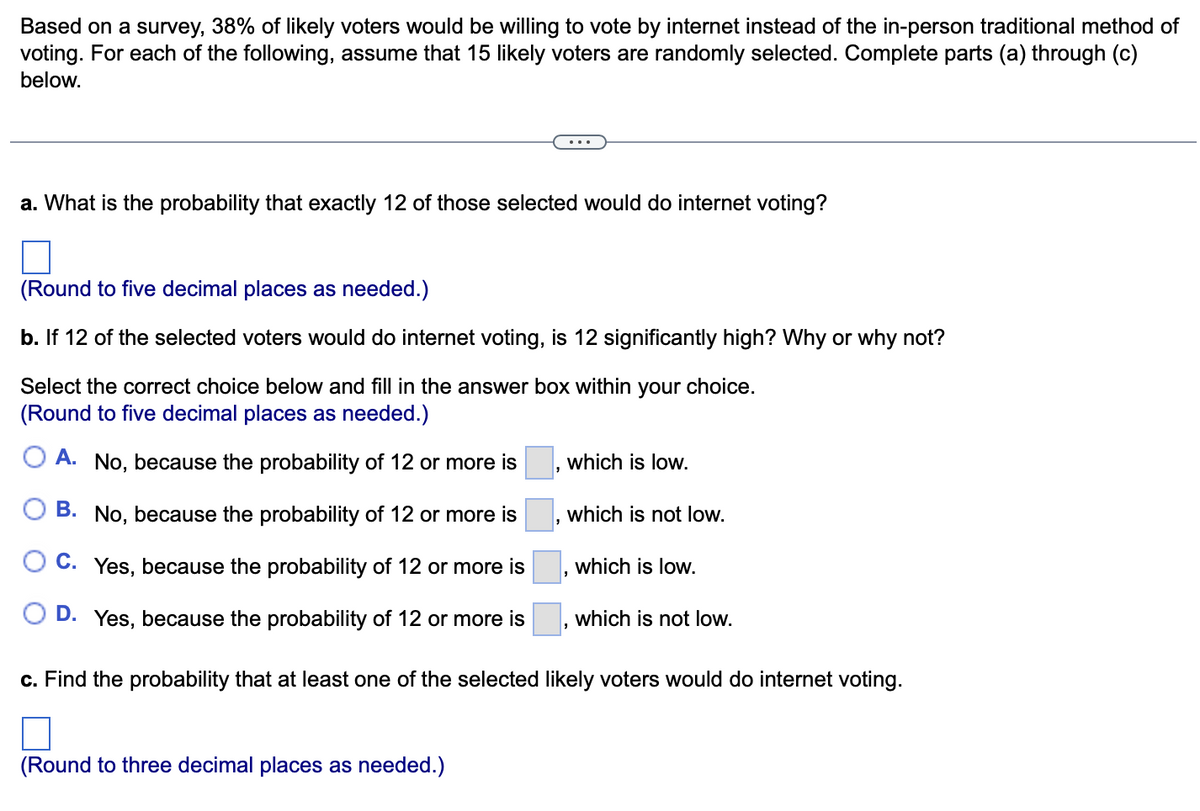Based on a survey, 38% of likely voters would be willing to vote by internet instead of the in-person traditional method of voting. For each of the following, assume that 15 likely voters are randomly selected. Complete parts (a) through (c) below. a. What is the probability that exactly 12 of those selected would do internet voting? (Round to five decimal places as needed.) b. If 12 of the selected voters would do internet voting, is 12 significantly high? Why or why not? Select the correct choice below and fill in the answer box within your choice. (Round to five decimal places as needed.) A. No, because the probability of 12 or more is B. No, because the probability of 12 or more is C. Yes, because the probability of 12 or more is D. Yes, because the probability of 12 or more is c. Find the probability that at least one of the selected likely voters would do internet voting. (Round to three decimal places as needed.) which is low. which is not low. which is low. which is not low.
Based on a survey, 38% of likely voters would be willing to vote by internet instead of the in-person traditional method of voting. For each of the following, assume that 15 likely voters are randomly selected. Complete parts (a) through (c) below. a. What is the probability that exactly 12 of those selected would do internet voting? (Round to five decimal places as needed.) b. If 12 of the selected voters would do internet voting, is 12 significantly high? Why or why not? Select the correct choice below and fill in the answer box within your choice. (Round to five decimal places as needed.) A. No, because the probability of 12 or more is B. No, because the probability of 12 or more is C. Yes, because the probability of 12 or more is D. Yes, because the probability of 12 or more is c. Find the probability that at least one of the selected likely voters would do internet voting. (Round to three decimal places as needed.) which is low. which is not low. which is low. which is not low.
Chapter8: Sequences, Series,and Probability
Section8.7: Probability
Problem 4ECP: Show that the probability of drawing a club at random from a standard deck of 52 playing cards is...
Related questions
Question
uno ocho

Transcribed Image Text:Based on a survey, 38% of likely voters would be willing to vote by internet instead of the in-person traditional method of
voting. For each of the following, assume that 15 likely voters are randomly selected. Complete parts (a) through (c)
below.
a. What is the probability that exactly 12 of those selected would do internet voting?
(Round to five decimal places as needed.)
b. If 12 of the selected voters would do internet voting, is 12 significantly high? Why or why not?
Select the correct choice below and fill in the answer box within your choice.
(Round to five decimal places as needed.)
A. No, because the probability of 12 or more is
B. No, because the probability of 12 or more is
C. Yes, because the probability of 12 or more is
D. Yes, because the probability of 12 or more is
which is low.
(Round to three decimal places as needed.)
which is not low.
"
which is low.
which is not low.
c. Find the probability that at least one of the selected likely voters would do internet voting.
Expert Solution
This question has been solved!
Explore an expertly crafted, step-by-step solution for a thorough understanding of key concepts.
This is a popular solution!
Trending now
This is a popular solution!
Step by step
Solved in 5 steps

Recommended textbooks for you


Algebra and Trigonometry (MindTap Course List)
Algebra
ISBN:
9781305071742
Author:
James Stewart, Lothar Redlin, Saleem Watson
Publisher:
Cengage Learning


Algebra and Trigonometry (MindTap Course List)
Algebra
ISBN:
9781305071742
Author:
James Stewart, Lothar Redlin, Saleem Watson
Publisher:
Cengage Learning